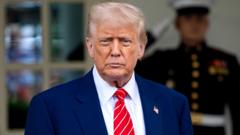The Trump administration is actively pursuing arrangements with various countries to facilitate the deportation of immigrants, while raising concerns about the potential human rights violations in these third-country prisons.
The Trump Administration's Controversial Deportation Strategy

The Trump Administration's Controversial Deportation Strategy
The United States is scouting new countries to offload deportees amidst tightening immigration policies.
The U.S. government's approach to immigration enforcement is becoming increasingly complex as the Trump administration seeks to outsource deportations to various nations. Currently, deportees—including many Venezuelans—are being sent to El Salvador, where they find themselves in a maximum-security prison notorious for its harsh conditions. The administration's strategy includes agreements with multiple countries, such as Panama and Costa Rica, for receiving deportees from regions like Asia, the Middle East, and Africa, even extending talks with Rwanda for future arrangements.
The plan, part of a broader effort to rid the U.S. of millions of immigrants considered undesirable, appears to be grounded in both tactical and strategic motives. Tactically, it allows for the removal of individuals from countries that refuse to accept their citizens back. Countries like Venezuela only sporadically permit deportation flights, thus necessitating alternative solutions. Strategically, the administration aims to instill a sense of dread among immigrants—both documented and undocumented—that the risks associated with staying in the U.S. may lead to imprisonment in brutal conditions, effectively encouraging self-deportation.
Moreover, there is a growing concern regarding the implications of these deportation agreements. By seeking arrangements with authoritarian governments and claiming such deportations are beyond judicial scrutiny, the administration is perceived as attempting to construct a global detention system that bypasses the due process rights typically afforded to migrants. The fallout from this strategy may resonate deeply as it becomes increasingly reliant on foreign nations keen to curry favor with U.S. policies.























